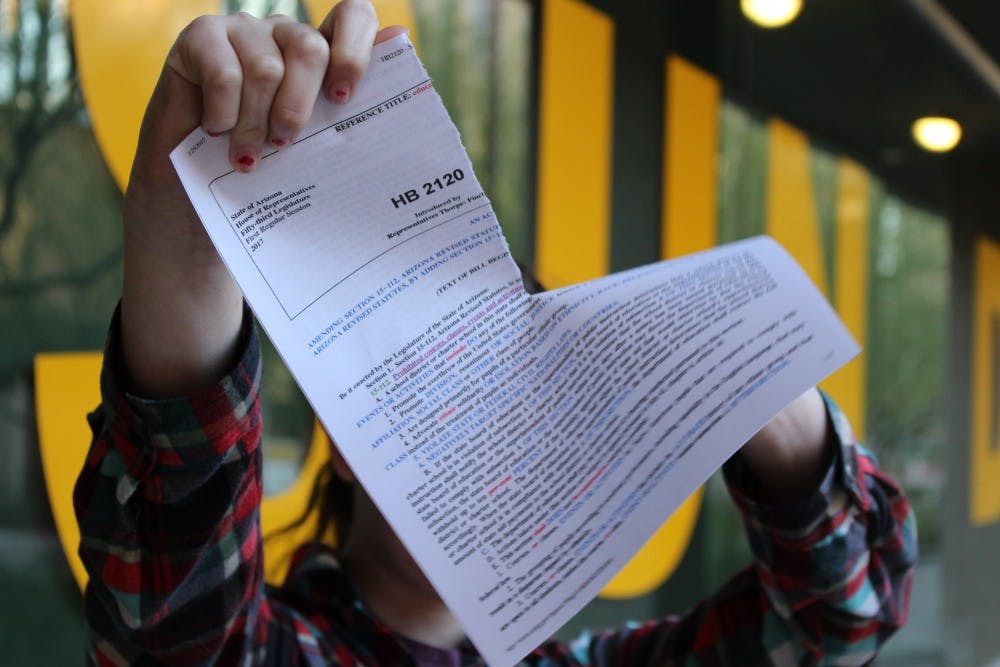Social justice, race, gender issues and religion are topics that are critical to understanding today's political climate. The fact that the government is working to strip students of studying issues pertinent to our understanding of politics and the world as it functions is disheartening.
House Bill 2120, introduced in the Arizona State Legislature by representatives Bob Thorpe and Mark Finchem, would have banned classes focused around “social justice toward a race, gender, religion, political affiliation, social class or other class of people." Thankfully, the chairman of the House Education Committee shut down the bill, stopping its progression for this legislative year.
However, if this bill had passed, or if it gets introduced again next session, this scenario could become reality for all Arizona college students.
Diversity and individuality—the key values this bill targets, are also the primary reasons for the existence of our country, and they are key components to the American Dream.
“(The bill) is ignoring the very foundation of American society,” LaDawn Haglund, associate professor of Justice and Social Inquiry, said. “The Pledge of Allegiance itself says ‘with liberty and justice for all.’ And they want to erase justice from the equation.”
Haglund said HB 2120 suggested the government doesn’t want people looking at the past or social science research to create a counterargument to the government’s ideological viewpoint.
It is difficult to make progress and expand as a country if the government is squashing every chance people have to educate themselves on the issues we are facing in the 21st century.
Even though the bill didn't apply to the entire country, the fact that a bill of this nature was proposed could motivate other states to create a bill with the same restrictions.
Dr. Mathew Sandoval, an ASU Honors Faculty Fellow, said this bill would have affected his students' ability to develop critical thinking skills through asking hard questions about topics like race, gender and religion in class.
“(A) part of what it means to be a 21st century citizen (is) not to deal with sameness, but to deal with difference constantly,” Sandoval said.
“Difference surrounds us. So if we enact works of legislation that preclude people from being able to actually engage with difference, then we are doing them a disservice because we are saying you can’t be a functional person in the 21st century.”
The bill and what it represented outraged many students, parents and public officials. Many people took to Twitter to rally together to contact Thorpe and have the bill shut down. Although the bill did have supporters, many students saw it as an infringement on their right to learn and enroll in the classes of their choice.
Protect Open Dialogue in #Arizona schools, stop HB2120https://t.co/RCkQBBhEu0 pic.twitter.com/TYa4NTg03m
— Mary Reynolds (@marycycle) January 12, 2017
#HB2120 is a disgusting slap in the face to justice, culture, pursuit of a higher level of thinking and improvement of society as a whole
— Sen. Martín Quezada (@SenQuezada29) January 11, 2017
The bill not only captured the attention of Arizonans, but it also received national attention from Teen Vogue, NBC New York, Yahoo News, The Washington Times and many other media outlets across the country.
Currently in Arizona, a similar bill exists, HB 2281, which went into effect Dec. 31, 2010. This bill bans classes that “promote the overthrow of the United States government, promote resentment toward a race of class of people, are designed primarily for pupils of a particular ethnic group or advocate ethnic solidarity instead of the treatment of pupils as individuals."
With a similar bill already existing, it is likely that HB 2120 will come up again in next year’s legislative session. These types of legislation demonstrate that the Arizona government is working very hard to ban classes that delve into social, justice and gender issues.
If this bill returns, students need to be ready to fight for their right to information.
“Organizing against it immediately would probably be the things students need to do,” Sandoval said. “It could mean a protest. It could mean a rally. It could mean a march. It could mean going out into the community of Downtown Phoenix and actually informing community members this is what is at state right here. And that would be a beautiful way to bridge the community and students together.”
Reach the columnist at afsuthe1@asu.edu or follow @a_sutherland10 on Twitter.
Editor’s note: The opinions presented in this column are the author’s and do not imply any endorsement from The State Press or its editors.
Want to join the conversation? Send an email to opiniondesk.statepress@gmail.com. Keep letters under 300 words and be sure to include your university affiliation. Anonymity will not be granted.
Like The State Press on Facebook and follow @statepress on Twitter.




